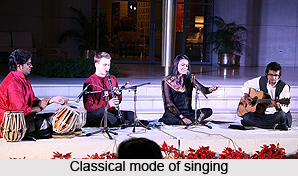 Elements of Indian Classical Music refer to those essential components which comprise Indian Classical Music. Apart from the many components which have gone into the formation and development of Indian Classical Music, there are certain basic elements which underlie all of Indian Classical Music. These are- the devotional element, fixed composition and improvisation and the verbal syllable. These are briefly discussed below.
Elements of Indian Classical Music refer to those essential components which comprise Indian Classical Music. Apart from the many components which have gone into the formation and development of Indian Classical Music, there are certain basic elements which underlie all of Indian Classical Music. These are- the devotional element, fixed composition and improvisation and the verbal syllable. These are briefly discussed below.
Devotional Element
The devotional element is one aspect of Indian Classical music which is easily identifiable. The various mystical philosophies of India are at once both universal as well as sectarian. This means that they hold as much appeal worldwide as they do in the country. Moreover, there are a number of religious sects in India and their interrelationship covers an entire plethora of human emotions from strife to tolerance. However, whatever the difference, the basic essence of all these religious beliefs is filtered down and finds expression in their musical outpouring.
Fixed Composition and Improvisation
Another major aspect of Indian Classical Music is the fine balance that is struck between fixed composition and improvisation. This is best revealed in the concept and performance of the Raaga. In the unfolding of the different Raagas is seen a fascinating inter-play of prescribed melodic movement and on-the-spot composition. Texture plays an important role and has social, musical, and pedagogic implications all at the same time. The texture in all of the music is either monophonic or heterophonic.
Verbal Syllable
A third thread found in all of Indian Classical Music focuses on the verbal syllable. This can be seen right from the naming of the pitches, to the abstract patterns of drum and dance, to the disintegration of a song text in performance. The meaning of music is often abstracted beyond the syntactical meaning of words, and most musicians spend their artistic life in finding this point of balance between a syllable`s verbal suggestion and its utility in rhythmic combination and textural abstraction. One can hardly think of the world of drumming, dance, and instrumental music without seeing the working out of these syllabic ideas.




















